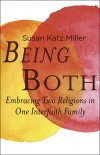This post is a very special one. To celebrate Susan's recent book Being Both: Embracing Two Religions in One Interfaith Family, Susan has offered to write a guest blog on celebrating a baby born into an interfaith family! Thank you so much, Susan, for this post and for all you do to support and educate the interfaith community. :)

For interfaith couples with a plan to celebrate both religions in the family, the arrival of a baby should be a source of creativity and joy, not cause for conflict. This is an opportunity to make a statement to yourselves, and to the world, that your child will benefit from both family traditions. Some interfaith couples hold back on performing baby-welcoming ceremonies, feeling that they did not have the right to claim these rituals, given the interfaith nature of their families. In contrast, I encourage the celebration of any and all welcoming rituals represented in your family tree. In my experience, and in my research, far more people end up regretting that they did nothing, than regretting that they celebrated.
I know, you’re exhausted, and the family patterns have been thrown into chaos. Do not feel you have to accomplish a full roster of traditional welcoming rituals on anyone else’s timetable, or to anyone else’s specifications. One of the wonderful aspects of being an interfaith family is that you have already been released from the tyranny of doing everything according to a single religious book. We can claim ancient religious rituals, while also reinventing them.
So if you have a Jewish baby-naming ceremony at six months, rather than at eight days, it can still have elements of tradition, and profound meaning for all in attendance. Children love the idea of having a Hebrew name: it can seem like a sort of secret alias, and an invitation to strengthen their connection to Judaism. One of the Christian rituals I really appreciate is the idea of godparents: adults who will serve as guides and protectors, as special unofficial aunts and uncles. We were living overseas when my daughter was a baby and toddler, so we didn't get around to choosing godparents. When she was in elementary school, we finally created an interfaith godmothering ceremony for her. In fact, she was old enough to help choose her own godmother. It seemed very fitting, and resonant, that the godmother she chose happened to also have a Jewish and Christian background.
If you have close relationships with clergy, they can help facilitate or lead welcoming ceremonies, as long as they understand your religious intentions and support your choices as an interfaith family. If you cannot find supportive clergy, you can still create meaningful welcoming ceremonies for babies (or older children, if you never did them), drawing on the elements that have most meaning to you from both family religions. Part of the joy of being an interfaith family, is the joy of giving yourself permission to innovate, while respecting and honoring family roots.

No comments:
Post a Comment